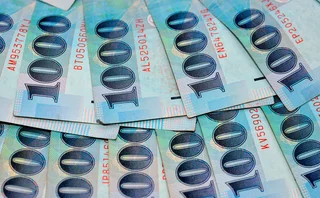
Decline in OTC derivatives for Singapore
Over-the-counter (OTC) derivatives turnover in Singapore has fallen 44% in the last three years, the Singapore Monetary Authority (MAS) has reported to the Bank for International Settlements (BIS). Average daily OTC derivatives turnover was $6.3 billion in April, a decline of US$4.9 billion from April 1998.
But Hong Kong appears to be an exception to this trend. The Hong Kong Monetary Authority (HKMA) reported an increase in average daily net turnover of OTC derivatives, a small fraction of its total turnover, by 9.4% to $4.2 billion. Mitchell Lim, head of Hong Kong dollar interest rate trading at Barclays Capital, said the increase was “probably due to the easing cycle in US dollar interest rates". "This then created certain volatilities in Hong Kong dollar interest rate movements and hence, advocated more OTC derivatives transactions in Hong Kong,” said Lim.
The survey results maintain Singapore as the third largest OTC derivatives trading centre in Asia-Pacific. The HKMA reported Hong Kong as maintaining its position as the eighth largest OTC derivatives trading centre in the region. The MAS reported that Singapore FX derivative activities averaged $3.1 billion daily, with OTC options continuing to be the most prevalent derivatives traded, averaging a daily turnover of $2.8 billion. Currency swaps amounted to $300 million in April 2001.
Singapore also maintained its position among the top four global FX centres, after the UK, the US and Japan. The average daily volume of FX trading in Singapore for April 2001 was $101 billion. The MAS reported that the decline of $27.6 billion from the average daily transactions volume of $139 billion in April 1998 is in line with global trends. Singapore’s FX market continues to be dominated by FX swaps, accounting for 57.3% of average daily turnover. Spot and outright forwards accounted for 34.3% and 8.4% of average daily turnover respectively. Major currencies dominate the transactions.
The Hong Kong Monetary Authority (HKMA) also reported a decline in net daily turnover of foreign exchange transactions which dropped by 15% to $66.8 billion, predominately as a result of a 39% decline in spot transactions to $19 billion. Forward transactions, which comprise a majority of the foreign exchange transactions, increased only marginally to $4.2 billion.
The MAS survey indicates trends of increased Singapore dollar trades. The average daily volume of Singapore dollar interest rate swaps traded in Singapore in April 2001 was $300.4 million, a significant increase from the 1998 data of $9.4 million. Similarly, average daily turnover for Singapore options against US dollars recorded a large increase from 65 million in April 1998 to $160.4 million in April 2001. The HKMA found that trading between the Hong Kong dollar and the US dollar also increased. This replaced the US dollar against the Japanese yen as the most heavily traded currency pair, both in foreign exchange and foreign exchange derivatives transactions.All figures are expressed in US dollars.
Only users who have a paid subscription or are part of a corporate subscription are able to print or copy content.
To access these options, along with all other subscription benefits, please contact info@risk.net or view our subscription options here: http://subscriptions.risk.net/subscribe
You are currently unable to print this content. Please contact info@risk.net to find out more.
You are currently unable to copy this content. Please contact info@risk.net to find out more.
Copyright Infopro Digital Limited. All rights reserved.
As outlined in our terms and conditions, https://www.infopro-digital.com/terms-and-conditions/subscriptions/ (point 2.4), printing is limited to a single copy.
If you would like to purchase additional rights please email info@risk.net
Copyright Infopro Digital Limited. All rights reserved.
You may share this content using our article tools. As outlined in our terms and conditions, https://www.infopro-digital.com/terms-and-conditions/subscriptions/ (clause 2.4), an Authorised User may only make one copy of the materials for their own personal use. You must also comply with the restrictions in clause 2.5.
If you would like to purchase additional rights please email info@risk.net
More on Foreign exchange
Will Taiwan lifers ramp up FX hedging amid tariff turmoil?
As TWD remains strong against the US dollar, Taiwanese life insurers are still poised to act
Deutsche Bank takes AutobahnFX on the open road
Proprietary trading platform sets out new workflow-based approach to collaborating with venues
Dealers bullish on Bloomberg chat interface for FX markets
Service expanded its API offering to integrate broker chats into banks’ engines for cash FX pricing late last year
LCH expects to boost deliverable FX clearing with new adds
Onboarding of dealers and link-up with CLS could swell interbank deliverable FX clearing volumes
Does no-hedge strategy stack up for mag seven mavericks?
At Amazon, Meta and Tesla, the lack of FX hedging might raise eyebrows, but isn’t necessarily a losing technique
Amazon, Meta and Tesla reject FX hedging
Risk.net study shows tech giants don’t hedge day-to-day exposures
Intraday FX swaps could signal new dawn for liquidity management
Seedling market could help banks pre-fund payments in near-real time and reduce HQLA requirements
Natixis turns on the taps in flow trading
French bank boosts flow business, balancing structured solutions capabilities







